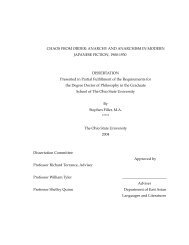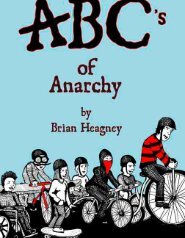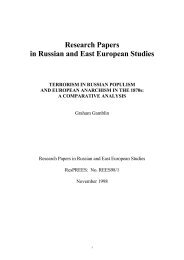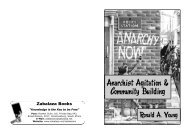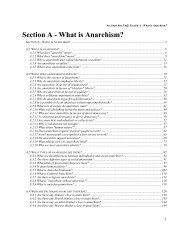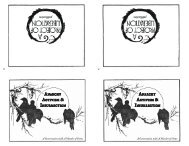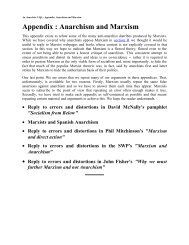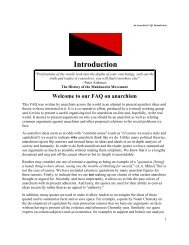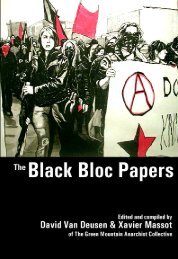Anarchists and Labor Unions - Infoshop.org
Anarchists and Labor Unions - Infoshop.org
Anarchists and Labor Unions - Infoshop.org
Create successful ePaper yourself
Turn your PDF publications into a flip-book with our unique Google optimized e-Paper software.
<strong>Anarchists</strong> have been active in the feminist, civil rights, anti-corporate globalization,<br />
environmental, <strong>and</strong> peace/anti-war movements. Renewed focus upon anarchism as a<br />
radical movement has resurged after the fall of the Soviet Union as a state-based<br />
alternative to capitalism (Day 2003). Increasingly wide-spread use of the Internet has also<br />
increased access to anarchist ideas <strong>and</strong> information, <strong>and</strong> allowed anarchists to<br />
communicate with each other—ironically within a highly anarchistic medium.<br />
Shantz (2003) argues that resistance movements (<strong>and</strong> anarchism in particular) that<br />
want “no part of the world order, new or otherwise” (p. 90) have been neglected by social<br />
movement literature. He argues that most social movement theory studies movements<br />
trying to influence or become part of the existing system as opposed to replacing the<br />
entire order. This shortcoming is important because of heightened participation by<br />
anarchists in recent years in both North America <strong>and</strong> throughout the world, <strong>and</strong> increased<br />
media coverage (Elliott 1999, Kahn 2000) following the anti-World Trade Organization<br />
demonstrations in Seattle during 1999 that anarchists had a large role in planning. As<br />
such, anarchism as both a political tendency <strong>and</strong> as a movement deserves more attention<br />
by sociologists <strong>and</strong> social movement researchers. This paper attempts to begin addressing<br />
this deficit in research.<br />
New Social Movements<br />
North American anarchist <strong>org</strong>anizations, groups that espouse an anarchist<br />
philosophy, may arguably be best understood by Fitzgerald <strong>and</strong> Rodgers’ (2000) model of<br />
radical social movement <strong>org</strong>anizations (RSMOs). Radical <strong>org</strong>anizations differ from<br />
moderate social movement <strong>org</strong>anizations in terms of <strong>org</strong>anizational structure, ideology,<br />
tactics, communication, <strong>and</strong> assessment of success. RSMOs are thus nonhierarchical,<br />
5



